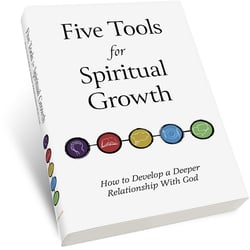If you want a deeper relationship with God, the tools are within your reach.
God gives us five powerful spiritual tools designed to strengthen our connection with Him and help us grow as Christians.
Our five-part book will walk you through what you can accomplish with these tools and offer advice on the best ways to put each one to use.
Download Your Free Copy

A resource you can keep coming back to
Five Tools for Spiritual Growth isn’t meant to be read in one sitting.
It’s a book that takes an in-depth look at each tool God gives us—a resource you can keep coming back to whenever you need to dig a little deeper into your spiritual toolbox.
Here’s what Five Tools for Spiritual Growth aims to help you develop in your life:
Part 1
A Better Prayer Life
Your prayers represent one half of the continuing conversation you have with God.
They are your opportunity to speak directly to the Creator of the universe—your Creator. There’s a good reason the Bible tells us to “pray without ceasing” (1 Thessalonians 5:17).

In Part 1 of Five Tools for Spiritual Growth, you’ll find:
A deep dive into each element of Jesus Christ’s model prayer.
What did He teach us to pray about—and why?
Answers to a selection of frequently asked questions about prayer.
How long should our prayers be? What if God isn’t answering? Does it matter what position we’re in when praying?
An exploration of noteworthy prayers in the Bible.
What can we learn from the words God’s people have prayed through the ages?
Part 2
More Meaningful Bible Study
Bible study is the other half of your conversation with God.
Prayer is how you can talk to God; Bible study is the primary way He chooses to talk to you.
Getting better at Bible study means getting better at listening to the “God-breathed” words of Scripture (2 Timothy 3:16, NIV).

In Part 2 of Five Tools for Spiritual Growth, you’ll find:
A guide to the Bible’s structure—from the order of the table of contents to the literary devices its authors employed.
How does the Bible’s internal timeline fit together? What does the style of a particular book tell us about the best way to read it? How can we spot the ways Bible writers added emphasis to their writings?
Different methods and approaches to take in your own personal studies, whether you’re reading through the Bible in its entirety or just a single verse.
What should you look for when reading through a chapter of the Bible? What about trying to understand a particular Greek or Hebrew word? What can you do to take effective notes as you read?
A primer on the myriad of different reference works available for studying God’s Word.
What’s the difference between a concordance and a lexicon? How useful are commentaries? What’s the best way to put a cross-reference to use?
The reasons why choosing your translation can make a world of difference in your studies.
How did we get our modern English translations? Why does the style of translation matter? What sort of things can be lost in the translation process, and how can we rediscover them?
Part 3
Meditation that leads to action
Religions around the world approach meditation in wildly different ways, but God offers it to us as a tool for thinking deeply about the truths He’s shown us—and for translating those thoughts into actions.
The ultimate goal of meditation is to “be transformed by the renewing of your mind, that you may prove what is that good and acceptable and perfect will of God” (Romans 12:2).

In Part 3 of Five Tools for Spiritual Growth, you’ll find:
A guide on how biblical meditation works.
How do we pick the subject and create the right environment for meditation? How can we engage with that subject?
Topics to meditate about.
When you don’t have a specific subject in mind, what are some biblical themes worth thinking about?
Reflections on the ultimate goal of meditation.
What can we hope to gain from the time we spend meditating on God’s Word?
Part 4
Fasting that makes a difference
Done wrong, fasting does nothing more than make us hungry and weak. Done right, fasting brings us closer to God in a state of teachable humility—a way to “turn to [God] with all your heart” (Joel 2:12).
If we want our fasts to make a difference, we have to understand what God wants us to focus on during those fasts.

In Part 4 of Five Tools for Spiritual Growth, you’ll find:
What fasting looks like in the Bible.
Where can we find an accurate definition of fasting in the Bible? What elements of the process deserve our attention?
The reasons that ought to motivate our personal fasts.
What motivations do we see in biblical fasts over and over again?
Examples of biblical fasts that made a difference.
When God’s people fasted in the Bible, what made those fasts worth writing about? Why did God pay attention to them?
Examples of biblical fasts that accomplished nothing.
Why did God criticize some of the fasts recorded in the Bible? What does that criticism tell us about the right way to fast?
Answers to a selection of frequently asked questions about fasting.
How often should we fast? How long should we fast? Did Jesus discourage fasting?
Part 5
Fellowship with God’s people that is consistently rewarding
One overlooked and misunderstood element of our relationship with God is our relationship with God’s people.
Fellowship is about the common ground we share as children of God, and it has the capacity to build us all up in ways that would be impossible on our own.

In Part 5 of Five Tools for Spiritual Growth, you’ll find:
A biblical overview of how fellowship is intended to work.
How do biblical authors talk about fellowship? How does God’s fellowship with us impact our fellowship with others?
Seven keys to godly fellowship.
What can we do to strengthen the fellowship we share with others?
Tips for relating to people who aren’t like us.
How can fellowship work when two people are coming from different worlds? What about when they’re on two ends of the personality spectrum?
The tools only work if you do
God supplies us with tools that are designed to bolster our spiritual growth in powerful and rewarding ways . . .
But they only work if we use them.
Download Your Free Copy
